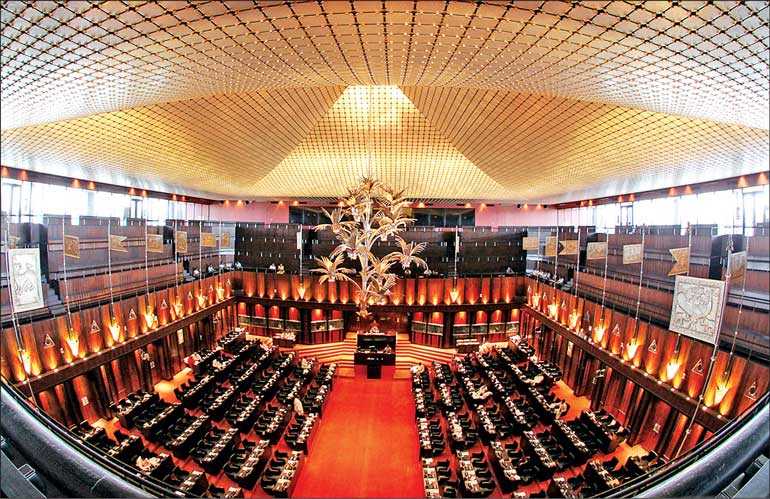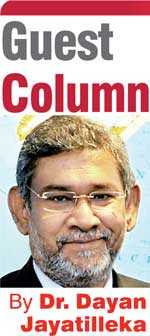Monday Feb 23, 2026
Monday Feb 23, 2026
Friday, 7 December 2018 00:00 - - {{hitsCtrl.values.hits}}

The 19th Amendment is not an alternative constitution!
“…The General [de Gaulle] devised a strong executive presidency in 1958, and introduced direct elections to it four years later, precisely in order to remove power from the hands of political parties and bring stability to French institutions...the original source of French presidential legitimacy: the direct mandate of the people, introduced by de Gaulle.” – Biography of Charles de Gaulle, The Economist (2018/07/26)
What is at stake in the battles in the courts is whether or not the Constitution has been up-ended by the 19th Amendment, even though a two-thirds majority and a referendum were not held in order to do so. 
Wickremesinghe had sent an ambitious draft which was challenged in the Supreme Court, which ruled that certain provisions either had to be removed or required a two thirds majority and the referendum. The SC pointed out that these provisions as they stood, infringed upon if not devalued the people’s franchise, an entrenched clause or more simply, the very basis of the Republican Presidential Constitution. These were in fact excised.
But when the truncated 19th Amendment was passed, Wickremesinghe was not a happy man. In his address to the Parliament he said that the new 19th Amendment was a temporary measure and that a new constitution which abolished the presidency would be brought soon enough.
Now Wickremesinghe wishes to act as if this has already been done and that we live in a new constitutional system, in which the presidency has not merely been reformed and partially restricted, but has actually been turned into a lame duck while the Parliament has been exalted into the centre of the political system, which is only nominally presidential.
All this simply because of a case of sour grapes on his part, because he ran for the president twice and failed, and knows that if there is another such election, he may have to vacate in favour of a more popular personality.
Wickremesinghe’s peeve against the presidency was manifested as far back as 2001-2003, when President Kumaratunga complained on the record to the foreign press, that he ignored and bypassed her at first and then tried to usurp her powers—and therefore she was constrained to kick him out.
Combined with this is the TNA’s longstanding compulsion or ‘drive’. The TNA’s political ancestors were afraid that universal suffrage would confer upon the majority its natural weightage in electoral politics and that the minorities would also be punching their natural weight. Thus the TNA carries an antipathy towards electoral democracy in its political genetic code. It preferred Prabhakaran’s tactics and strategy because that cut through the electoral advantage of the majority. Today the TNA prefers a Parliament in which it is the kingmaker, to a presidency which is directly elected by the nation as a whole.
What however is the logic of the presidential system? As is well known J.R. Jayewardene modelled the 1978 Constitution, and indeed his original advocacy of such a system in 1966 and 1972, on General de Gaulle’s French constitution. What then was the logic of that ‘parent model’?
The Economist (UK) carries an essay of the French presidency in the form of a review of a new book, by the British historian Julian Jackson. It was published in the Books and arts section of the print edition of The Economist, under the headline “Jupiter’s father”. Here are key extracts which shed light on the inspiration and animating spirit of the 1978 Sri Lankan Presidential republic:
“…de Gaulle is remembered above all as a heroic figure: a leader who refused to admit defeat, and persuaded the French that their true spirit, uncrushed by submission to Nazi Germany, would ultimately prevail…
“…The general devised a strong executive presidency in 1958, and introduced direct elections to it four years later, precisely in order to remove power from the hands of political parties and bring stability to French institutions. In 2016 Mr. Macron…was able to defy the might of the two mainstream parties thanks to the original source of French presidential legitimacy: the direct mandate of the people, introduced by de Gaulle.”
The review essay significantly entitled ‘Jupiter’s father’ in The Economist gives the deep reasoning and the intellectual-psychological background of the French Presidency, and is directly relevant to comprehending the Sri Lankan Constitution, which modelled itself on the Gaullist:
“De Gaulle’s unwavering belief in his ability to embody the nation, and his modelling of a constitution topped with a near-monarchical presidency, also shaped the heavy expectations—and the disappointments—that have surrounded his successors ever since. Some of them explicitly embraced the Gaullist legacy, notably Jacques Chirac, who denounced the American ‘hyperpower,’ urged a counterbalancing multi-polar world, and relished the strong, centralised presidency. Others, or more accurately François Hollande, flinched at grandeur. After the whirlwind years under Nicolas Sarkozy in 2007-12, voters were at first drawn to the ‘normal’ presidency that Mr. Hollande sought to embody, as he headed off on holiday by train and adopted the forgettable posture of a middle manager. But the French soon realised that they like their head of state to look grand after all.
“It was while he was working as an adviser to the normal President Hollande that Mr. Macron began to develop his theory of a ‘Jupiterian’ presidency. The loss of the king and the post-revolutionary Terror, he argued, had created an ‘emotional, imaginary collective void’ at the centre of the French republic. This left the French feeling insecure, and in need of a leader who invested the presidency with a certain aura and mystique. If German political leadership is defined by the application of law, he contended, French society, historically structured around the Catholic Church and the monarchy, needs clear vertical authority and a president who incarnates power.”
(This article appeared in the Books and arts section of the print edition of The Economist under the headline ‘Jupiter’s father’. https://www.economist.com/books-and-arts/2018/07/26/de-gaulle-model-for-macron)
The 19th Amendment was not an alternative constitution or even a mini-constitution! It cannot change an existing constitution into a new one. It cannot change the pre-eminent institution, whose pre-eminence derives legitimacy from popular sovereignty, as the sole institution directly elected by the people taken as a whole, into an institution that is co-equal to or even subordinate to the legislature composed of the political parties.
The whole logic of the French presidential republic is the combination of the republican character and the presidential character. At the root is popular sovereignty and popular sovereignty is primarily represented not through Parliament but through the directly elected presidency, because the people considered as one, as a whole, a totality, superseded the arithmetical addition of the people broken up into localities and political parties. It is only the directly elected presidency that is representative of the people taken as a single entity.
It is that which enables Sri Lankans to think of themselves as a single nation. It is only in that moment that we are regarded as one: when the whole country votes together, to elected its leader, the President.
The Parliament is a kaleidoscope of shifting coalitions elected as and from a patchwork of localities. The President is elected by the island taken as one unit, a single entity. That is also precisely why the President is our leader; not the Parliament; and the directly-elected presidency is the apex of our State form, our State system and structure—not the Parliament. The 19th Amendment modified the architecture of one corner of our State system. It did not, could not, abolish, reverse or invert it.